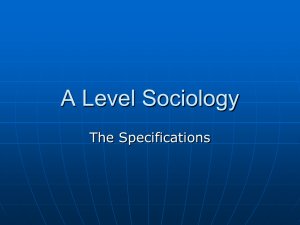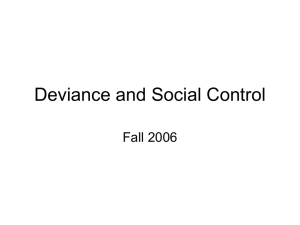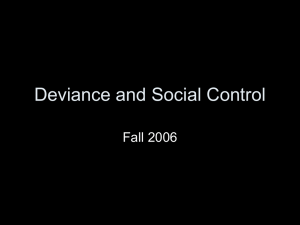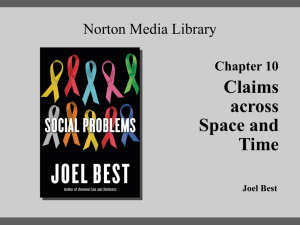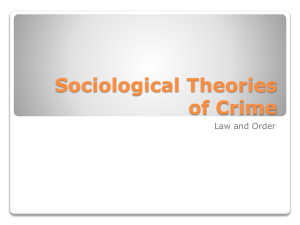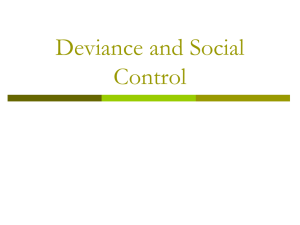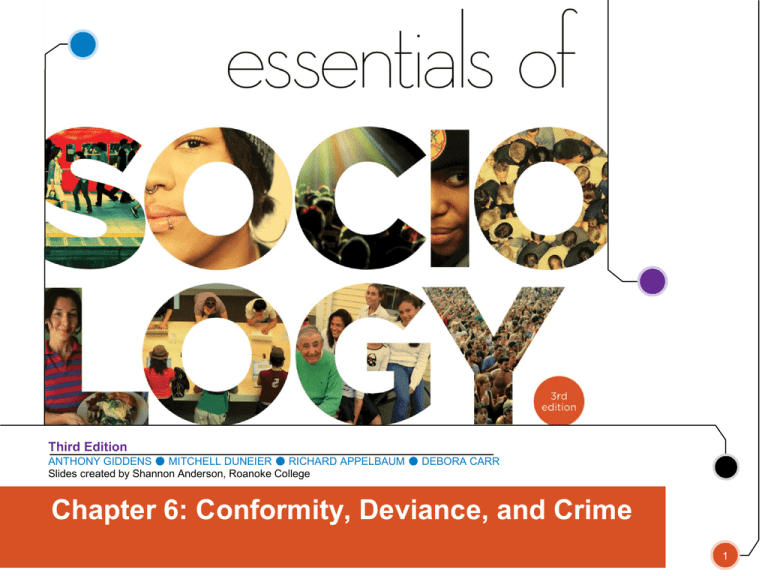
Third Edition
ANTHONY GIDDENS ● MITCHELL DUNEIER ● RICHARD APPELBAUM ● DEBORA CARR
Slides created by Shannon Anderson, Roanoke College
Chapter 6: Conformity, Deviance, and Crime
1
Norms and deviance
• The cultures that societies create are built out
of norms.
• These norms represent the values of the group.
• When individuals and groups deviate from
norms, society responds.
• Deviance can range from chewing gum in the
wrong place to capital murder and beyond.
© 2011 W. W. Norton Co., Inc.
2
Big questions on deviance
•
In the United States, there are many
questions to ask about deviance, crime, and
punishment, including:
–
–
–
–
Why are incarceration rates so high?
Why are racial disparities so significant?
Who are “deviants”? (What counts as deviant?)
Which rules are observed and which are broken?
© 2011 W. W. Norton Co., Inc.
3
Deviant behavior
• Deviant behavior is that which does not
conform to the rules or norms of a society or
community.
• It is important to consider issues of power:
whose rules or norms are being broken?
© 2011 W. W. Norton Co., Inc.
4
Deviance and crime
• Not all deviance is crime, and not all crime is
deviant.
• Deviance is in the “eye of the beholder.”
© 2011 W. W. Norton Co., Inc.
5
Figure 6.1 Intersection of Deviance and Crime
Essentials Of Sociology, 3rd Edition
Copyright © 2011 W.W. Norton & Company
Group deviance
• Deviance occurs, not only at the individual level,
but also among groups.
• Corporations, governments, organizations, and
social groups can all take part in deviance.
• There are deviant subcultures, ranging from the
homeless to religious cults to punks.
© 2011 W. W. Norton Co., Inc.
7
Sanctions and social control
• When someone breaks an important norm, there is
a response, a sanction.
• Sanctions can be positive or negative, depending
on the breach.
• Sanctions can be enacted formally or informally.
• The degree of sanctions varies according to the
importance and type of norm broken.
© 2011 W. W. Norton Co., Inc.
8
Three views of deviance
• Biological
• Psychological
• Sociological
• The biological and psychological perspectives
locate deviance in the person, while
sociological perspectives locate deviance in
the act.
© 2011 W. W. Norton Co., Inc.
9
Sociological perspectives
• Sociological perspectives on deviance are
wide-ranging:
–
–
–
–
–
Functionalist
Reinforcement
Conflict
Symbolic interactionist
Chicago School
© 2011 W. W. Norton Co., Inc.
10
Functionalist theories of deviance
• Durkheim’s influence
– Anomie: In modern societies norms have been lost
but not replaced, leaving people without a center.
– Deviance and crime as normal and necessary
• Merton’s typology
– Deviance as a by-product of inequality
© 2011 W. W. Norton Co., Inc.
11
Figure 6.2 Merton’s Deviance Typology
Essentials Of Sociology, 3rd Edition
Copyright © 2011 W.W. Norton & Company
Reinforcement theories
• Deviance is seen as learned, even normalized,
behavior.
• We act based on perceived rewards and costs,
which may be economic, social, and so on.
• Differential association is one of the better
known reinforcement theories.
© 2011 W. W. Norton Co., Inc.
13
Conflict theory
• Conflict theorists want to know why people
commit crimes.
• Crime is seen as political action intended to
challenge the power structure.
• Laws are tools of the powerful that reproduce
inequality.
• Individuals are responding to inequities built
into capitalism.
© 2011 W. W. Norton Co., Inc.
14
Symbolic interactionist approaches
• Labeling theory is one well-known approach.
• Deviance is found, not in the act, but in the
response, in the label applied.
• There is a connection with conflict theory in
that the labels are applied by those with power
onto those without.
© 2011 W. W. Norton Co., Inc.
15
The Chicago school
• Chicago school sociology is, most broadly, a
kind of urban sociology.
• In dealing with deviance, broken windows
(BW) theory is the best-known example.
• BW theory is focused on the realization that
any kind of social disorder leads to more social
disorder.
© 2011 W. W. Norton Co., Inc.
16
How is crime reported?
• UCR—Uniform Crime Reports
• NCVS—National Crime Victimization Survey
© 2011 W. W. Norton Co., Inc.
17
Figure 6.3 Crime Rates in the United States, 1985– 2008
Essentials Of Sociology, 3rd Edition
Copyright © 2011 W.W. Norton & Company
Gender and crime
• Men are more likely to be both perpetrators
and victims of crime and to be incarcerated.
• The “gender contract” may lead to differential
treatment with authorities.
• Ties to children and others may prevent
women from engaging in deviant acts.
© 2011 W. W. Norton Co., Inc.
19
What is your risk?
How likely are you to be a victim of a crime? Answer these 10 questions and
compare your answers with the risk factors reported on the next page.
1. What is your gender?
2. What is your race or ethnicity?
3. Do you live in a poor, middle- class, or wealthy neighborhood?
4. Have you been a victim of a crime in the past?
5. Do you live in the South?
6. How often do you drink alcohol?
7. How old are you?
8. How much is your annual income?
10. What is your job
© 2011 W. W. Norton Co., Inc.
20
Your risk
Increase Chances of Crime
Victimization?
Decrease Chances of Crime
Victimization?
Male
Female
African American or Native American
White or Asian
Reside in poor neighborhood
Reside in a neighborhood with a high
crime rate
Reside in middle- class neighborhood
Reside in a neighborhood with a low crime
rate
Having been a victim in the past
No prior victimizations
Reside in the South
Reside in the non- South
High levels of alcohol use
Low to moderate levels of alcohol use
Teenager or young adult
Mature adult
Low household income
Moderate to high income
Divorced or separated
Work as law enforcement officer, security
guard, or taxicab driver
Currently married
________________________
Work as college professor
Source: U.S. Bureau of Justice Statistics 2008c.
© 2011 W. W. Norton Co., Inc.
21
White-collar crime
• White-collar crime is that which is carried out
by those in non-manual labor, higher-status
jobs.
• These crimes are typically non-violent but can
be extremely damaging to society (e.g.,
Enron).
• White-collar crimes include embezzlement,
various kinds of fraud, illegal sales, and more.
• Those who perpetrate these crimes are rarely
prosecuted.
© 2011 W. W. Norton Co., Inc.
22
Incarceration Rates
Around the World
Number of People
in Prison per
100,000 population
INDIA 33
CHINA 119
BRAZIL
242
NIGERIA 27
FRANCE
96
SWITZERLAND
76
MEXICO
132
JAPAN
63
MYANMAR
132
0
100
SOUTH AFRICA
330
300
CUBA
513
ISRAEL
325
500
700
RWANDA
593
1,000
Essentials Of Sociology, 3rd Edition Copyright © 2011 W.W. Norton & Company
UNITED
STATES
760
RUSSIAN
FEDERATION
660
SOURCE: Walmsley 2009
23
© 2011 W. W. Norton Co., Inc.
Incarceration Rates
Around the World
Who’s in Prison in the United States?
Black
40%
Hispanic
20%
Female
9%
Under 18
0.4%
Other
5%
White
35%
Non U.S.
Citizens
5.9%
Essentials Of Sociology, 3rd Edition Copyright © 2011 W.W. Norton & Company
Violent
Offenders
53%
Public-Order
Offenders
7.6%
Property
Offenders
19.2%
Drug
Offenders
19.5%
SOURCE: Walmsley 2009
24
© 2011 W. W. Norton Co., Inc.
The U.S. prison system
• Crime and punishment remain top priorities for
Americans.
• Currently:
– It costs more than $25,000 per year per inmate.
– More than 25 percent of African American men
are under the authority of the penal system.
• Imprisonment is not a powerful deterrent.
© 2011 W. W. Norton Co., Inc.
25
The death penalty
• The United States has continued high levels of
support for the death penalty.
• There have been problems in recent years with
uneven access to DNA testing.
• Two-thirds of executions since 1977 have
taken place in five states: Texas, Virginia,
Oklahoma, Missouri, and Florida.
© 2011 W. W. Norton Co., Inc.
26
Functions of punishment
• Punishment functions at both the individual
and group levels.
• For individuals, punishments are not only to
sanction the guilty, but to warn potential
offenders.
• For the group, punishment functions to
reinforce the moral unity of the collectivity.
© 2011 W. W. Norton Co., Inc.
27
This concludes the Lecture
PowerPoint Presentation for
Chapter 6: Conformity, Deviance, and Crime
For more learning resources, please visit our online StudySpace at:
http://www.wwnorton.com/college/soc/essentials-of-sociology6/
W. W. Norton & Company
Independent and Employee-Owned
© 2011 W. W. Norton Co., Inc.
28
Clicker Questions
1. What is deviance?
a. a transgression of social norms that are accepted by most
people in a community
b. breaking the law
c. the kind of behavior engaged in by members of groups that
have been marginalized by society
d. criminal behavior that abides by social norms
© 2011 W. W. Norton Co., Inc.
29
Clicker Questions
2. What was Robert K. Merton’s theory of crime?
a. People are more likely to commit crime when they do not have
the opportunity to pursue the goals—such as the accumulation
of material wealth—that their society sets.
b. People are more likely to commit crime if they associate with
carriers of criminal norms.
c. People are more likely to commit crime when they have the
opportunity to steal from someone who trusts them.
d. People are more likely to commit crime if they have committed
a crime already.
© 2011 W. W. Norton Co., Inc.
30
Clicker Questions
3. Compared with ordinary crimes against property (robberies,
burglaries, larceny, etc.), the amount of money stolen in whitecollar crime (tax fraud, insurance fraud, etc.) is
a. about the same. Crimes against property cost the nation about
as much as white-collar crime.
b. less. White-collar crimes involve only one quarter of the
money involved in crimes against property.
c. more. White-collar crime involves perhaps forty times as much
money as crimes against property.
d. not really comparable. White-collar crimes such as
embezzlement affect very few people.
© 2011 W. W. Norton Co., Inc.
31
Clicker Questions
4. Why did Émile Durkheim think a certain amount of crime was
functional for society?
a. It provides a healthy release for male aggression.
b. It highlights the boundaries of social norms.
c. It keeps the police and court system active.
d. The existence of crime makes law-abiding citizens more
careful about protecting their property.
© 2011 W. W. Norton Co., Inc.
32
Clicker Questions
5. What is the essence of labeling theory?
a. Deviance is defined through the process of interaction between
deviants and nondeviants.
b. Deviance is in the eye of the officeholder.
c. One person’s deviance is another's indulgence.
d. Deviants resist the labels they are given by law enforcement
authorities.
© 2011 W. W. Norton Co., Inc.
33
Clicker Questions
6. What are norms?
a. formally crafted, written guidelines citizens of a nation must
follow or face time in prison
b. ordinances applicable to a given metropolitan area
c. legal restrictions applying only to elected officials
d. unwritten rules of social life
© 2011 W. W. Norton Co., Inc.
34
Art Presentation Slides
Chapter 6
Conformity, Deviance,
and Crime
Anthony Giddens
Mitchell Duneier
Richard P. Appelbaum
Deborah Carr
Chapter Opener
Essentials Of Sociology, 3rd Edition
Copyright © 2011 W.W. Norton & Company
Figure 6.1 Intersection of Deviance and Crime
Essentials Of Sociology, 3rd Edition
Copyright © 2011 W.W. Norton & Company
Computer hacker Kevin Mitnick was arrested in 1995
and later convicted of stealing millions of dollars worth
of software from a number of technology companies.
Essentials Of Sociology, 3rd Edition
Copyright © 2011 W.W. Norton & Company
Figure 6.2 Merton’s Deviance Typology
Essentials Of Sociology, 3rd Edition
Copyright © 2011 W.W. Norton & Company
Members of an El Salvadoran gang flash signs and
display their tattoos.
Essentials Of Sociology, 3rd Edition
Copyright © 2011 W.W. Norton & Company
According to interaction-ists, it’s not the act of smoking
marijuana that makes one a deviant, but the way others react
to marijuana smoking.
Essentials Of Sociology, 3rd Edition
Copyright © 2011 W.W. Norton & Company
Figure 6.3 Crime Rates in the United States, 1985– 2008
Essentials Of Sociology, 3rd Edition
Copyright © 2011 W.W. Norton & Company
Figure 6.4 Murder Victims by Race and Sex, 2008
Essentials Of Sociology, 3rd Edition
Copyright © 2011 W.W. Norton & Company
One of the most high profile white collar criminals
in recent memory is Bernie Madoff, a financier who
choreographed a $50 million
Essentials Of Sociology, 3rd Edition
Copyright © 2011 W.W. Norton & Company
Figure 6.5 State and Federal Prison Population, 1925– 2008
Essentials Of Sociology, 3rd Edition
Copyright © 2011 W.W. Norton & Company
How do factors such as a criminal record affect an
individual’s ability to get a job?
Essentials Of Sociology, 3rd Edition
Copyright © 2011 W.W. Norton & Company
Incarceration Rates
Around the World
Number of People
in Prison per
100,000 population
INDIA 33
CHINA 119
BRAZIL
242
NIGERIA 27
FRANCE
96
SWITZERLAND
76
MEXICO
132
JAPAN
63
MYANMAR
132
0
100
SOUTH AFRICA
330
300
CUBA
513
ISRAEL
325
500
700
RWANDA
593
1,000
Essentials Of Sociology, 3rd Edition Copyright © 2011 W.W. Norton & Company
© 2011 W. W. Norton Co., Inc.
UNITED
STATES
760
RUSSIAN
FEDERATION
660
SOURCE: Walmsley 2009
Incarceration Rates
Around the World
Who’s in Prison in the United States?
Black
40%
Hispanic
20%
Female
9%
Under 18
0.4%
Other
5%
White
35%
Non U.S.
Citizens
5.9%
Essentials Of Sociology, 3rd Edition Copyright © 2011 W.W. Norton & Company
© 2011 W. W. Norton Co., Inc.
Violent
Offenders
53%
Public-Order
Offenders
7.6%
Property
Offenders
19.2%
SOURCE: Walmsley 2009
Drug
Offenders
19.5%
Globalization and Everyday Life
Essentials Of Sociology, 3rd Edition
Copyright © 2011 W.W. Norton & Company
Globalization and Everyday Life
Essentials Of Sociology, 3rd Edition
Copyright © 2011 W.W. Norton & Company
W.W. Norton & Company
Independent and Employee-Owned
This concludes the Art Presentation Slides
Slide Set for Chapter 6
Essentials Of Sociology
THIRD EDITION
by
Anthony Giddens
Mitchell Duneier
Richard P. Appelbaum
Deborah Carr

